Key takeaways:
- Audiovisual workshops enhance learning through hands-on experiences and collaboration, fostering community among participants.
- Shaping workshop outcomes with clear objectives and feedback sessions leads to better engagement and valuable insights.
- Interactive elements, storytelling, and small group discussions significantly improve participant involvement and connection.
- Continuous improvement in workshops requires open dialogue, measurable goals, and celebrating small wins to motivate growth.
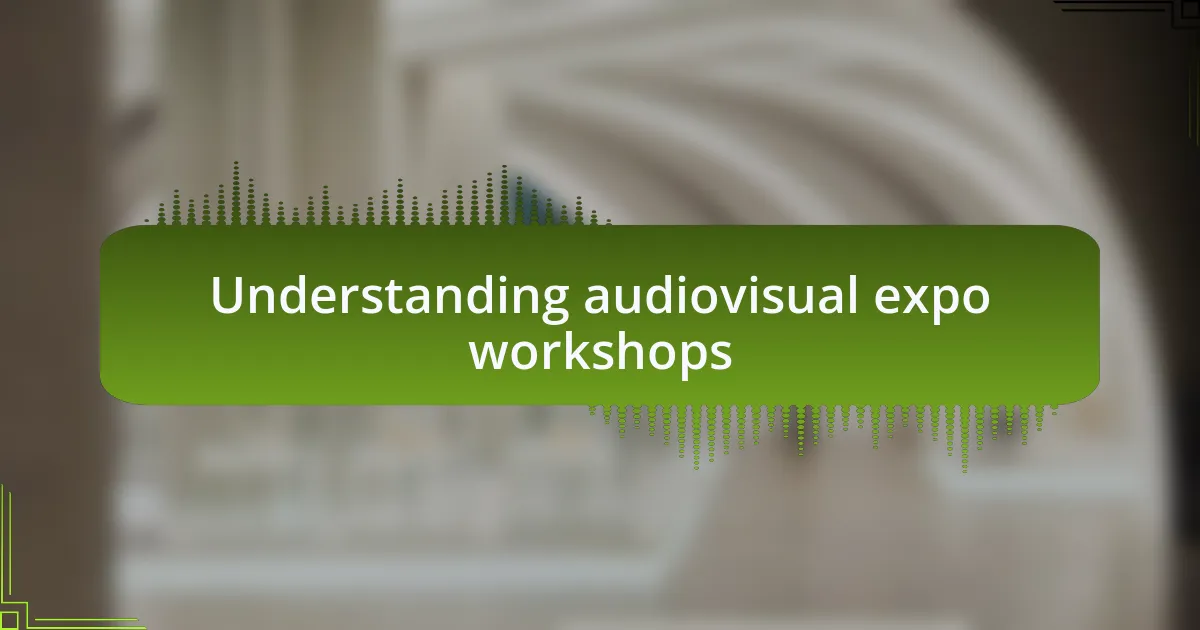
Understanding audiovisual expo workshops
Audiovisual expo workshops play a crucial role in bringing together industry professionals and enthusiasts to share knowledge and expertise. I remember attending a workshop where a seasoned videographer shared his experiences with storytelling through film. His passion for his craft was infectious, and it made me realize just how powerful audiovisual media can be in conveying a message.
Consider the moment when a live demonstration took place, showcasing cutting-edge technology. Participating in these hands-on experiences allowed me to see firsthand how the latest equipment could transform a simple idea into a stunning visual narrative. Have you ever felt the thrill of creating something innovative? That feeling is what these workshops aim to ignite in every participant.
Workshops often provide a collaborative environment where attendees can learn from one another. During one particularly insightful session, we broke into small teams to work on a project. The exchange of creative ideas was electric, and I left feeling inspired and connected to others who shared my passion. Isn’t it incredible how a simple workshop can foster such a vibrant community?
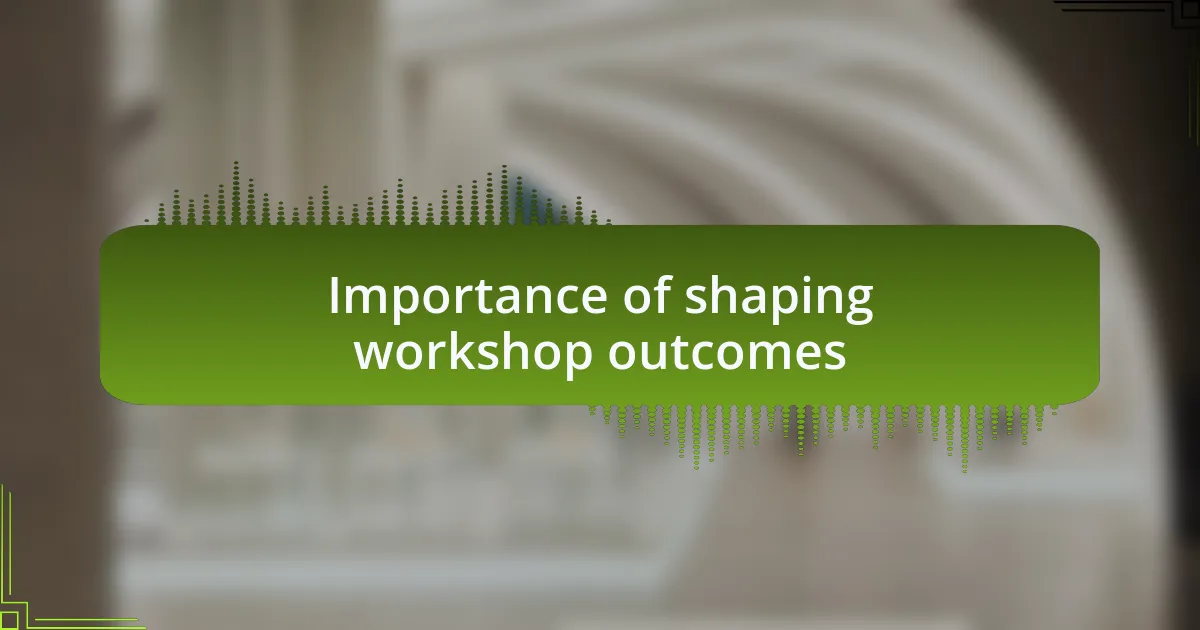
Importance of shaping workshop outcomes
Shaping workshop outcomes is essential because it ensures that every participant walks away with valuable insights and practical skills. I once attended a workshop that initially felt overwhelming, but by the end, the facilitator had tailored the sessions to focus on specific techniques that resonated with us. It made me appreciate how crucial it is for facilitators to pinpoint key learning objectives that align with participants’ needs.
When I think about my experiences, I realize that effective outcomes are not just about what is taught; it’s also about how it’s received. In a recent workshop, we conducted feedback sessions that allowed us to express what we hoped to achieve. That process not only clarified our goals but also made me feel heard, reinforcing the importance of listener engagement in shaping outcomes.
Moreover, aiming for well-defined outcomes can create lasting connections among participants, amplifying their learning experiences. I vividly recall another workshop where a simple icebreaker led to deeper conversations about our challenges in the industry. Have you ever noticed how informal interactions can yield some of the most insightful discussions? That workshop underscored how intentional shaping of outcomes can enhance community-building in our professional spheres.
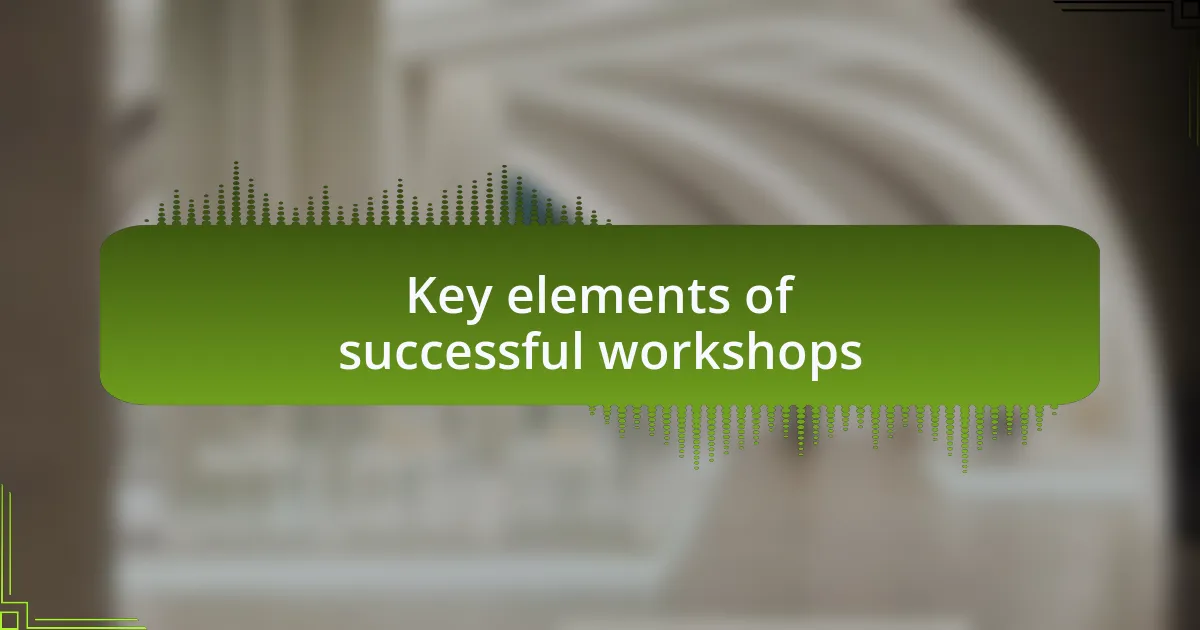
Key elements of successful workshops
Successful workshops boil down to preparation and participant engagement. I remember a workshop I attended where the facilitator opened with a warm welcome and a brief overview of what we could expect. That first impression set the tone for the rest of the day, encouraging openness and making it easier for participants to share their thoughts. It’s amazing how a simple greeting can break the ice, isn’t it?
Another key element is practical application. In one session, we were divided into small groups to tackle real-world problems. This hands-on approach not only deepened our understanding but also felt more relevant to our daily work. I can still recall the satisfaction of brainstorming solutions with colleagues who shared my passion. It’s in those moments of collaboration that true learning happens, wouldn’t you agree?
Lastly, follow-up is often overlooked but critically important. After a particularly impactful workshop, the facilitator reached out to us weeks later with resources to continue our learning journey. That gesture showed her commitment to our growth and reinforced the lessons we learned. It made me realize that the workshop experience doesn’t end when you leave the room; it’s about nurturing those connections and insights over time. How often do you see that kind of dedication in workshops?
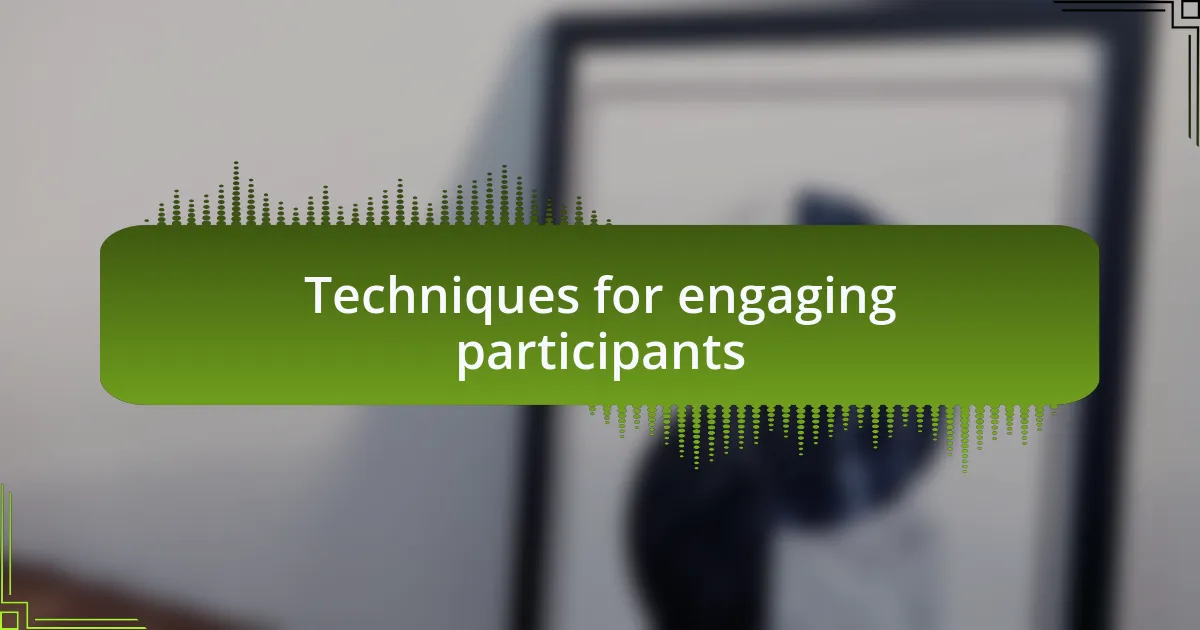
Techniques for engaging participants
One effective technique I’ve found for engaging participants is incorporating interactive elements like polls or live Q&A sessions. I remember a workshop where the facilitator used a real-time polling tool to gauge our opinions on various topics. The instant feedback was energizing; it felt like we were all part of a shared conversation, rather than just passive listeners. Have you ever experienced that heightened sense of involvement when your opinions are instantly acknowledged?
Storytelling can also be a powerful way to connect with participants emotionally. During a workshop on leadership, the speaker shared a personal story about a failure he encountered early in his career. His vulnerability resonated deeply with us, making the lessons he imparted feel more relatable and impactful. It made me realize how sharing our struggles can create a safe space for others to open up as well. Doesn’t it feel great when someone shares their journey and it sparks a connection?
Finally, leveraging small group discussions fosters deeper engagement. In one such workshop, we were encouraged to break into pairs to discuss our insights after each topic. The intimacy of those conversations allowed us to delve deeper into the material, often leading to “aha!” moments that wouldn’t have surfaced in a larger group setting. I’ve always believed that these smaller interactions can ignite creativity and collaboration. Have you noticed how much more comfortable people feel sharing ideas when they’re in a smaller circle?
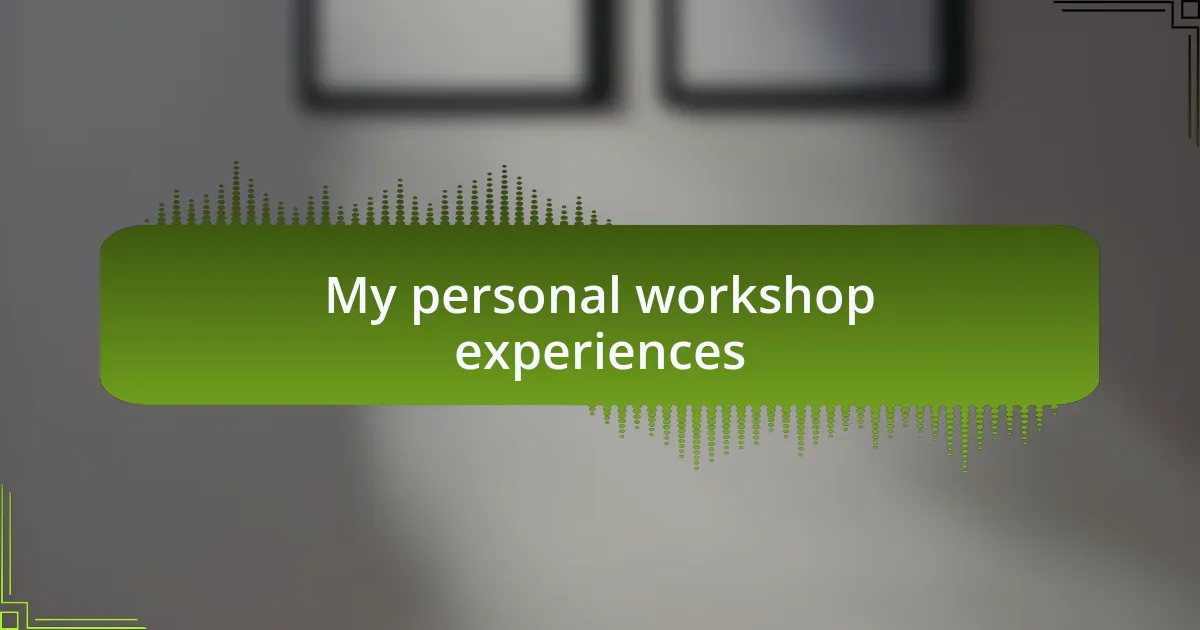
My personal workshop experiences
I’ve attended numerous workshops that have left a lasting impression on my outlook and approach to facilitation. One that stands out was focused on creative problem-solving. The facilitator encouraged us to use visual mapping tools to express our ideas, and I was amazed by the depth of clarity it brought to my thoughts. Have you ever noticed how drawing something out can unlock a hidden understanding in your mind?
Another memorable experience was a workshop on public speaking, where improvisation exercises played a key role. I remember being thrown into a spontaneous speaking challenge where I had to deliver a two-minute pitch on a random object. The adrenaline rush was palpable, and it taught me a valuable lesson about thinking on my feet. How often do we truly step outside our comfort zones to find our voice?
In a recent workshop about collaboration in project teams, we were divided into groups to tackle a real-world case study. The collaboration felt electric; ideas flowed freely, and I found myself inspired by the diverse perspectives around the table. It was a reminder of the power of diverse thoughts and how they can lead to innovative solutions. Have you experienced that moment when the collective energy of a group ignites a spark of creativity?
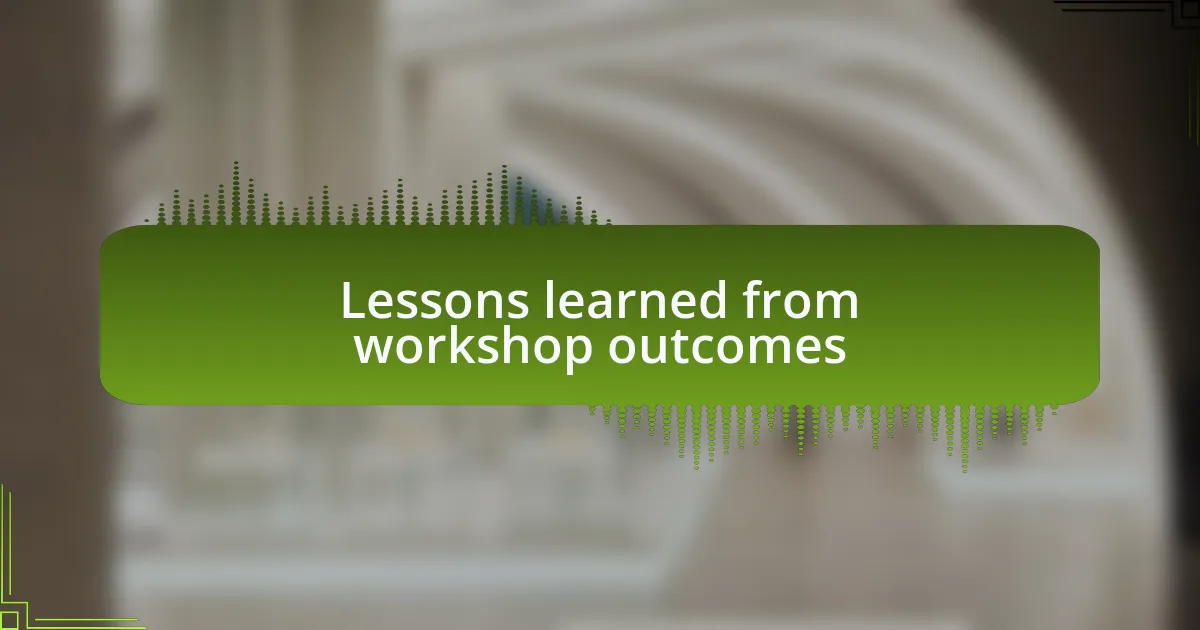
Lessons learned from workshop outcomes
When reflecting on the outcomes of the workshops I’ve attended, I’ve learned how crucial feedback can be. In one session, we assessed each other’s presentations, and I realized how constructive criticism isn’t just about pointing out flaws; it’s a valuable tool for growth. Have you ever found that small pieces of feedback can ignite immense change in your work?
Another lesson I extracted is the importance of adaptability during group activities. I recall a workshop where the plan shifted dramatically due to technical difficulties. Instead of being flustered, we turned the situation into an opportunity for creativity. This taught me that being open to change can lead to unexpected and impressive results. How often do we cling to a plan, missing out on the magic that spontaneity can bring?
Lastly, the realization that engagement levels directly correlate with outcomes has been significant in my experience. In a recent workshop, I noticed that when participants were encouraged to share their personal stories, the atmosphere transformed. The vulnerability fostered deeper connections, which, in turn, sparked richer discussions. Have you ever experienced a moment where a simple sharing led to a breakthrough idea?
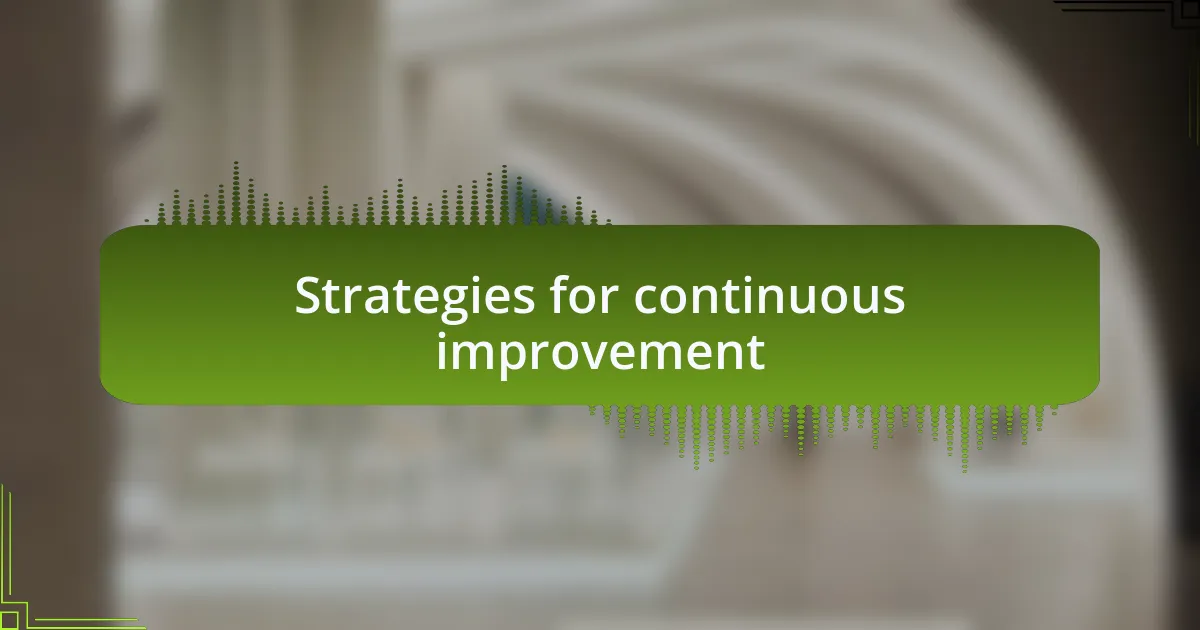
Strategies for continuous improvement
One key strategy for continuous improvement is to foster a culture of open dialogue. In one workshop I participated in, a simple post-session coffee discussion led to a breakthrough idea. It wasn’t the formal structure that sparked innovation; rather, it was the casual atmosphere where everyone felt free to voice their thoughts. Have you ever noticed how less formal settings can lead to richer conversations?
Another crucial element is setting measurable goals. During a series of workshops, I began to track specific outcomes, like participant engagement and comprehension levels. By quantifying what we aimed to achieve, it became easier to identify areas needing adjustment. Reflecting on this, I’ve often thought: aren’t those tangible metrics like guiding stars in our continuous journey toward excellence?
Lastly, I’ve learned that celebrating small wins is vital to maintaining momentum. After successfully implementing a participant feedback suggestion in a recent workshop, our team took a moment to recognize the improvement. It was a reminder that progress, no matter how small, can fuel motivation. Have you ever found that acknowledging the little victories helps ignite a passion for further growth?